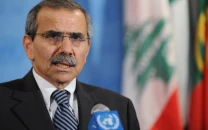Pakistan will be world's sixth largest nation by 2050: report
Data lists down ten countries that will receive the greatest increase in population by 2050

PHOTO: SOURCEABLE
The data lists down ten countries that will receive the greatest increase in population by 2050. Pakistan which is listed number six on the list is expected to reach a population of 344 million as the world population reaches 9,7 billion in 2050.
Further, India tops the list as the world's largest country in 2050 as its population is expected to grow to 1,660 million. Whereas, China makes it to number two and United States to number three as the largest countries by population in 2050.
Read: Pakistan's population expected to exceed 300 million by 2050: UN report
 PHOTO: PRB
PHOTO: PRBRead: Pakistanis outnumber Emiratis in three UAE states
An earlier report by the Population Division of the Department of Economic and Social Affairs of the United Nations also revealed similar findings.
The report predicted that between 2015 and 2050, half of the world’s population growth is expected to be concentrated in nine countries, including Pakistan, India, Nigeria, Democratic Republic of the Congo, Ethiopia, United Republic of Tanzania, United States of America, Indonesia and Uganda, while confirming that Pakistan’s population is expected to surpass 300 million by 2050.
The report also indicated a key increase in population in African countries making, one-third of the world African by 2050.
Read: Vulnerable populations: Population risks, post-disaster healthcare issues discussed
Commenting on the population-data revelations, Wu Hongbo, UN Under-Secretary-General for Economic and Social Affairs said: “Understanding the demographic changes that are likely to unfold over the coming years, as well as the challenges and opportunities that they present for achieving sustainable development, is key to the design and implementation of the new development agenda.”
However, Jennifer Blanke, chief economist for World Economic Forum expressed concern about the report, questioning how the governments will manage the growing populations in the respective countries.
Read: Poverty: 60.3% Pakistanis living on $2 a day
“If these countries are to meet the needs of their rapidly growing populations, they have to be able to deliver both sustainable economic growth and social inclusion. But while almost everyone agrees with that, we’re still struggling to establish the best way of achieving it. That’s something political, business and civil society leaders will need to work together on, and is indeed the main goal of the initiative I’m leading.” She said.
This article originally appeared on CNN.



















COMMENTS
Comments are moderated and generally will be posted if they are on-topic and not abusive.
For more information, please see our Comments FAQ